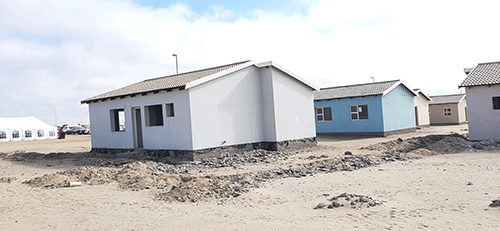Maihapa Ndjavera
Government is consulting key stakeholders to prevent vulnerable persons from losing their primary homes as banks foreclosed on houses valued at N$230 million during the first six months of 2021.
According to justice ministry spokesperson Simon Idipo, the issue of defaulting debtors losing their homes, particularly primary homes, has been an ongoing concern for years.
“The courts realised that the process which was in place prior to the rules changing was not adequate to protect often vulnerable members of our communities from losing their homes,” he explained.
During a consultative process at a local hotel on Wednesday, Idipo said an aspect of judicial oversight was introduced through rule 108 of the 2014 High Court rules in an effort to mitigate the impact. “The objective was to enquire into the reasons for non-payment, and whether there are less drastic measures that can be used to avoid the sale of a person’s primary home”.
The identified stakeholders involved in the consultations are banks, debt collectors, homeowners, legal aid representatives, legal practitioners in private practice, the Ombudsman and the Magistrates Commission, who discussed possible reforms to mitigate the impact on homeowners and how to balance various interests.
The ongoing consultations with stakeholders aim to gauge views, understand various processes, and find collective solutions to this burning issue.
Minister of justice Yvonne Dausab has indicated that she intends to re-table the bills during the course of the first or second session of the National Assembly that in part address this issue once the targeted consultations are done to inform the debate in the National Assembly.
During the meeting, chief legislative drafter at the ministry Freed Zeda said identified problems include that debtors, often from poor and vulnerable backgrounds, have been at risk of losing their primary homes because of different reasons such as limited time within which to secure assistance to defend their cases.
“The proposal is to increase the days for entering notice of intention to defend to summons from 10 to 21 days, and in case of applications, 14 to 21 days,” he noted.
Furthermore, the discussion should consider whether there is a need to introduce reserve prices for all property sold in execution, valuations of such property, the basis of such valuation, and who bears the costs of the valuation. Zeda claimed that the value at which immovable property is sold is municipal value, and is not beneficial for all parties involved.
There is thus a need for a uniform debt management process by creditors. Creditors should consider the possibility of changing the existing law, which does not set a limit on the amount that must be due before proceedings for recovery of debt can be invoked, Zeda submitted.
“Consider the possibility of limiting the change to cases that involve premises used as a primary home,” he added.
Meanwhile, the Bankers Association of Namibia (BAN) said by the first six months of 2021, banks were compelled to foreclose on houses valued at N$230 million. This was as Covid-19 continued to threaten job security and severely impacted household income.
However, BAN emphasised that home foreclosure is the absolute last step, considering banks’ overall intent to keep owners in their houses rather than the opposite.
“Sales in execution are often entwined in processes that can take up to five years and longer, which underpins the burden that banks carry as a consequence of the non-repayment of loans by clients when they encounter financial hardship,” the association explained via a statement issued yesterday.
“In broad strokes, banks manage the debt relief process through the client’s proactive engagement and detailed discussions and negotiations with a workout strategy which will eventually result in the client servicing the loan either partially or over an extended term. Should the client continue to default after remediation agreements, including various options to restructure the loan are reneged on again, the client’s account will be handed over to attorneys, who will also go to considerable lengths to reach a remedial agreement with the defaulting client.
In the event that the client still does not adhere to any agreement, the attorneys will institute summons to proceed with a sale in execution”, the BAN stated.
They added that defaulting clients have further recourse for dispute resolution, particularly since High Court Rule 108 came into effect, which stipulates that when a house is the primary residence of its owners, or people renting it from the owner as their primary residence, a court must consider measures that are less drastic than allowing the house to be sold because of the property owners’ debts.
“Collectively, these processes take several years to exhaust, during which time the banks, as the entrusted entity to manage their clients’ money prudently, carry the financial burden,” read the BAN statement.


